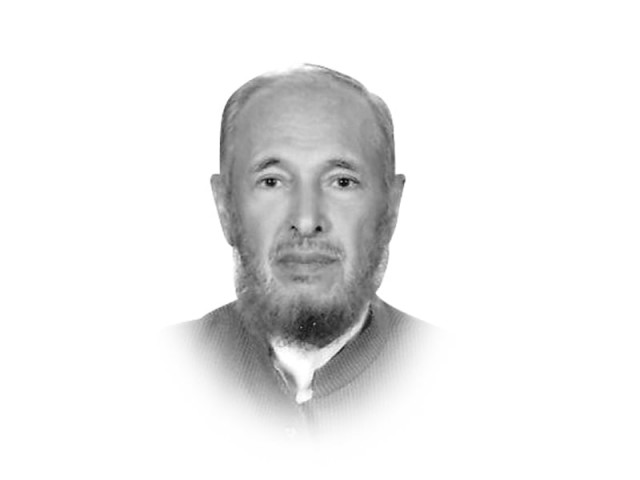No safe exit for Musharraf
Any safe exit for Musharraf would mean choking to death morbid, decaying institutions of the rule of law and justice.

The writer has served as ambassador to Afghanistan and chief secretary of Khyber-Pakhtunkhwa. He is a nominee of the Government of Pakistan in talks with the TTP
Musharraf is the only military ruler who has lived on to see the return to power of his nemesis. In addition, times have changed. There is an awareness, a vibrant media — though not as fiercely independent as some would like to think. Then there is the ‘political’ dimension — the pressure on the government from its own cadres of legislators and activists. But above all, it is a question of upholding the principles of justice, which includes institutionalised retribution. It is a question of the triumph of the rule of law as opposed to expediency driven by the instinct to protect and safeguard those with clout.

What is it that Musharraf didn’t do in his autocratic rule that trampled the constitution and massacred all state institutions? Was he not guilty of the Kargil misadventure which was carried out behind the back of the democratic government? A wholly unwarranted and preposterous intervention in the territory of another state that cost more than 650 lives of Pakistani soldiers, while causing a loss of more than $1 billion to the exchequer. Then, he is guilty of leading the October 12, 1999 coup that ousted an elected government and which was prompted by his own sacking as army chief. The Supreme Court’s validation of the coup can by no means legitimise a naked assault on the constitution. It becomes clear that all state institutions, including the judiciary, operate under the overarching control of despotic rulers.
Plunging Pakistan headlong into someone else’s war for the sake of promoting his own career as an unconstitutional ruler, Musharraf put the fate of the country on line and caused permanent, irretrievable damage to the state, particularly to its peace and security. Moving the military into the tribal area to further ingratiate himself with his Western benefactors upset the balance of power and destroyed the equilibrium of forces that had ensured the area’s stability and peace. The fraudulent referendum of 2002, well rehearsed and orchestrated with state resources where only 20 per cent people voted, would remain a stigma on the dictator’s name. Musharraf resorted to dismantling the administrative structures without any need and without any authorisation, which has nearly caused the collapse of district administration. The mayhem in Karachi, the dismal law and order situation in Quetta, parts of Khyber-Pakhtunkhwa and parts of Punjab are all manifestations of the total failure of a system which a military dictator imposed on the country apparently to ‘change the administrative culture’ and glorify himself as a great ‘reformer’. The emergency of 2007 was clearly another grave and unpardonable violation of the constitution.
But besides the repeated violations of the Constitution, the most terrible legacy that Musharraf has left behind is of a country torn asunder by a vicious cycle of violence and an unstoppable militancy that has ruined the country’s economy, damaged its institutions, destroyed its national fabric and polarised its society. He went around the world proclaiming that insurgency was the number one issue that his country faced, thereby linking Pakistan’s image with militancy and insurgency — an image that has created deep suspicions about the systems and institutions of Pakistan. When he was questioned repeatedly during a visit to Washington over the fate of Mukhtaran Mai — a woman who was raped in a district of Punjab and who was invited to visit the US, Musharraf lost his temper and said: “Any woman in Pakistan who wants a US visa gets herself raped!” That was the time to arrest and punish him for bringing disgrace to the country he was supposed to be leading. There was this deeply ingrained belief in his paranoid mind that he could get away with anything that he would do in ‘national interest’ (read: for personal glorification). The same prompted him to address the American Israel Public Affairs Committee meeting in the US on one of his many visits to that country. Not only that, he dispatched the then foreign minister, Khurshid Kasuri, to Turkey to formally meet with his Israeli counterpart in utter disregard of the sentiments of millions of Pakistanis.
It is a myth that there were others who ought to be held accountable for the many wrongdoings of Musharraf. The dictator held absolute control over all decision-making and no one would dare give a dissenting view on ‘crucial’ issues. Doing that would lead to a swift penalty — and some did pay the price. The chorus of voices emanating from his increasingly shrinking coterie of supporters with regard to catching the ‘others’ is a lame excuse that is meant to take the focus away from the dictator’s many anti-Pakistan atrocities.
Any safe exit for the former dictator would mean choking to death the morbid and decaying institutions of the rule of law and justice. The tens of thousands of people killed, villages and houses demolished, billions of dollars wasted on fighting militancy are the terrible legacies of a dictator whose reign in office has seen Pakistan lose its identity. Could such a person be allowed to escape justice and roar once again from the safe havens he has created in Dubai, London and US cities?
Published in The Express Tribune, April 27th, 2014.
Like Opinion & Editorial on Facebook, follow @ETOpEd on Twitter to receive all updates on all our daily pieces.















COMMENTS
Comments are moderated and generally will be posted if they are on-topic and not abusive.
For more information, please see our Comments FAQ